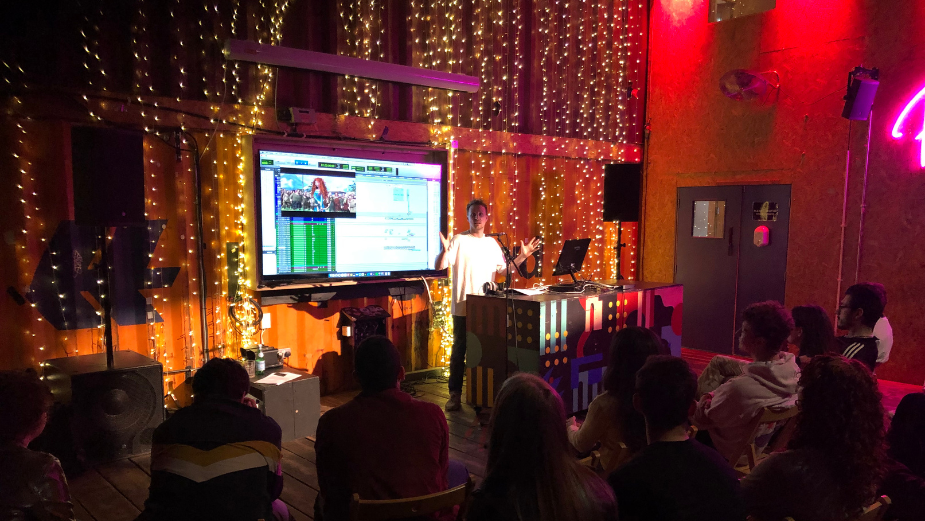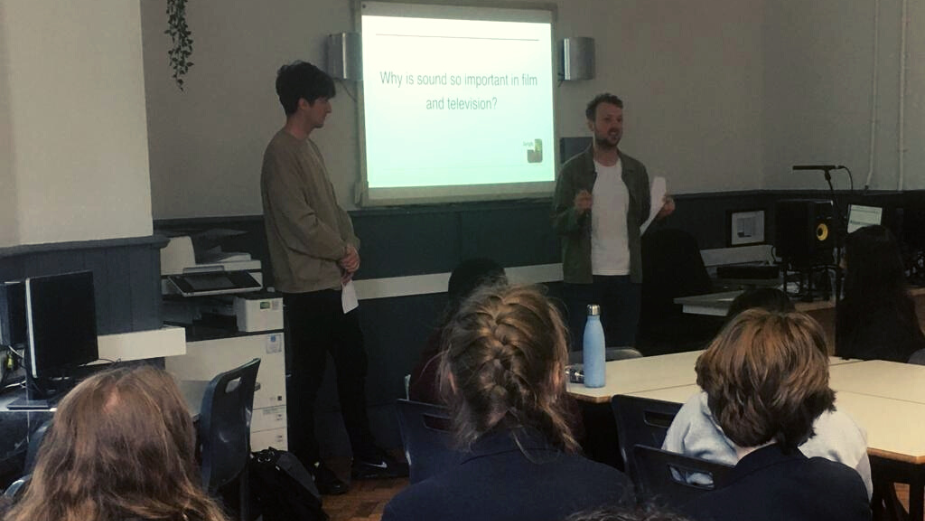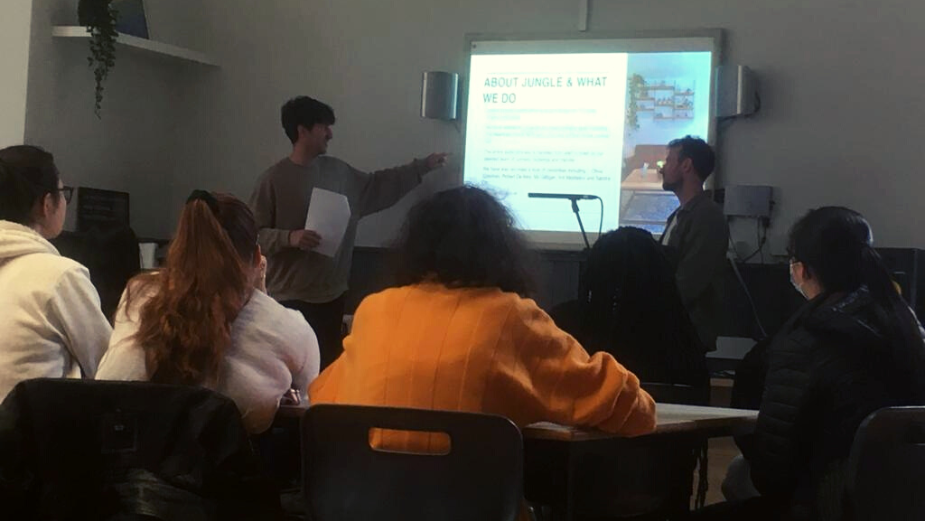
“We Must Shift the Industry’s Mentality to Breed Culturally Relevant Work”

From running workshops at schools and colleges across the country - including SCA, APA and Carshalton Girls School - to partnering with East London’s Sound Skool for underprivileged kids to build sound and post into the curriculum, Jungle Studios are working to help spearhead a shift in the industry when it comes to talent acquisition and career opportunities.
In this interview, LBB’s Sunna Coleman sits down with Jungle’s managing director Graham Ebbs, sound designer Sean Mahoney, and sound designer Stuart Allen-Hynd to open the discussion on nepotism, the hidden world of post, and what it takes to become a truly culturally impactful company.
LBB> Jungle has been working with a number of schools and colleges over recent years to educate students on opportunities within post and sound - especially in underprivileged communities. Can you tell us about what your driving factor is?
Graham> There are a number of different layers to it. There’s the layer which is providing training for the industry, then there’s the layer of awareness in underprivileged communities who may not have heard of sound and post, and then there’s the layer of giving them some routes in when they don’t have connections.
Doing this work requires a lot of effort in reaching out to schools and colleges and building relationships, but it’s important for us because although most schools have a careers officer, they tend to only promote traditional career routes. Even the music departments don’t tend to know that post exists.
Sean> When I was at school, I didn't really excel academically, and the skills that I had for making and recording music I thought were useless because there were no jobs that I knew of where they could be useful. So that’s why I’m passionate about opening up undiscovered avenues for students who may be in similar situations as me and make them aware that these creative skills do have a worthwhile place when you know where to look. There are so many creative jobs out there, they’re just not spoken about because they are non-conventional.
Graham> What typically happens at the moment is that someone you know will recommend a family friend who’s looking for work experience. But there are so many underprivileged kids out there that will never have the chance to be given these opportunities. Doing this outreach is a great way of finding new talent and giving them a leg up without fishing around in the same pools within the closed circle of the industry. We want to level the playing field and ensure we are getting a diversity of talent into the industry.
Stuart> Although we don’t have a huge problem with recruiting good people, the issue is that they tend to all come from similar backgrounds. When you get a continuous cycle of one type of person coming in, you get a very narrow minded workplace with one type of cultural experience and references to draw from. And that breeds the same kind of content. So if you want to create diverse, culturally important, meaningful content, you need other points of view, other experiences, from different environments, classes and backgrounds who can authentically speak to that.
In my opinion, it’s only then that you stand in better stead to become a more culturally relevant company that resonates with all different communities and backgrounds.

“I really enjoyed seeing how sounds were layered onto video. I am so grateful I got to attend as it widened my knowledge of the number of jobs available within the film industry - being a foley artist looks like a lot of fun! I now have a grasp of how I would like to pursue my future within the film industry.” - Violet, Carshalton Girls School “I really enjoyed seeing how sounds were layered onto video. I am so grateful I got to attend as it widened my knowledge of the number of jobs available within the film industry - being a foley artist looks like a lot of fun! I now have a grasp of how I would like to pursue my future within the film industry.” - Violet, Carshalton Girls School
LBB> What reactions have you had from students so far?
Graham> When we do these workshops, you can see the light bulb moment that happens for these kids when they realise there's a whole other world out there where their skills are worth something. It is really really difficult for students, because music is a closed shop and there are far less opportunities on the music side than there are on the post side. But they don’t know that post exists. There are a lot of different things you can do in post and there's actually more of it that you can earn money from.
It’s always great to see the students’ eyes light up when they realise they could have an amazing career that pays well doing something that they love. After our recent workshop at Carshalton Girls School, for example, we had a student contact us the very next day for work experience.
Like I said, there’s so much talent out there but it is untapped. And it will remain untapped unless we can make them aware that the post world exists.
LBB> Why is this so important to you and the industry?
Graham> I didn’t have a particularly privileged background myself and I didn't know anyone who worked in post - in fact I certainly didn't know post existed until I was 25. So it’s a case of making sure this doesn’t continue to happen. And there are a lot of people right now saying that they want to attract more diverse talent into the industry but they aren’t putting it into action and taking the time to do the practical stuff to make it happen.
It’s important because there are people out there that are really, really good and if we don't do this, they will never get the opportunity. And therefore, you'll get somebody who's not as good that gets the opportunity instead, which doesn't do anything for us as a company and doesn't do anything for the industry.
Stuart> Actions speak louder than words. We really want to see more action being taken and more people taking responsibility for bringing this industry to those who could really make a difference.
As it currently stands, the industry is built on nepotism. It's not what you know, it's who you know. And I think that’s happened because it’s easier as an employer when someone comes recommended. But if we want to improve the industry and bring in diverse perspectives and the best talent, the structure has to change and the mentality has to change.
Graham> It’s the opposite of virtue signalling - it's doing it rather than just saying it.

“I really enjoyed the workshop as it made me aware of a part of the media industry that I wasn't that aware of before. My favourite part was creating the Foley art because it allowed us to get experience using props and figuring out how to make different sounds. They were really kind and answered all our questions with lots of detail.” - Aaliyah, Carshalton Girls School
LBB> How are you hoping that things develop and change in the near future?
Graham> It’s great that we’re doing this at Jungle but there’s a limit to what we can do alone because we’re just one company.
What we’re trying to do with the sound school in East London at the moment is to get a system in place so that by January, when everyone's pretty quiet in post, we can get some students to our studios to do some workshops as part of their curriculum. And we’re very involved with putting that curriculum together.
So I'm hoping that if we can start to do this and find a way that makes it work, other people in sound and other parts of the industry can do something similar.
It does take some time to get up and running but once you’ve got the presentations together, and you realise what works and what doesn't work, it’s just about refining. It's something that I think every part of the industry could potentially do if they just got off their asses and did it!
If more companies start working together this way, then we can get these kids the opportunities they need. If we don’t have any current vacancies, we can open up other doors for them with studios who have similar programmes. But unless you put that effort in, you're not going to get anything out.
Sean> I actually find it such an enjoyable experience to go out and talk to these students because this job can be unglamorous at times - you work hard and you’re constantly onto the next job without time for appreciation. But when I go out and show people what I do, it helps me appreciate it again. It’s a very passion-led job and speaking about it with students who never knew it existed but love music and sound and get excited by it, makes me remember how much I love it too.
Stuart> And it’s not just a post issue. But all different industries could benefit from this and work together more to open up creative opportunities where there haven’t been before. We’re educating students on the routes into audio post production, but what’s also important is that we have connections for those who may be interested in other areas like film directing, costume and wardrobe, or makeup and prosthetics, for example.
It’s about drawing these parallels and other career opportunities where we might be able to just give someone a valuable leg up.













